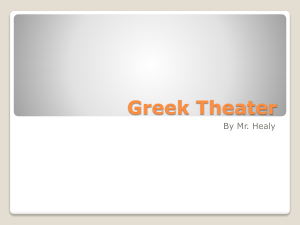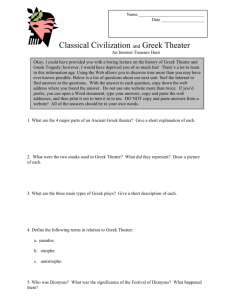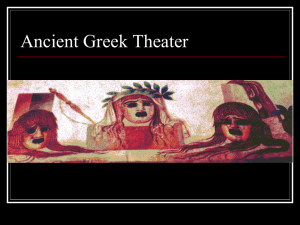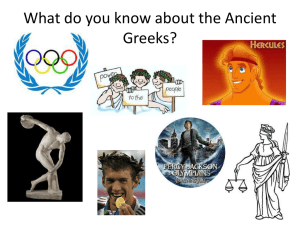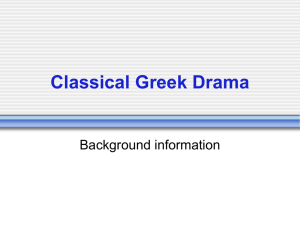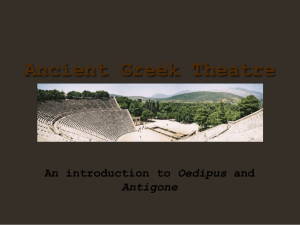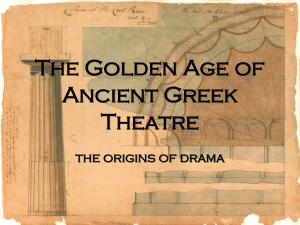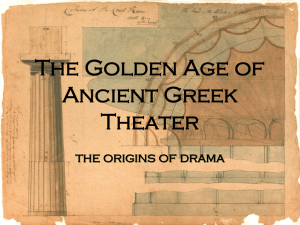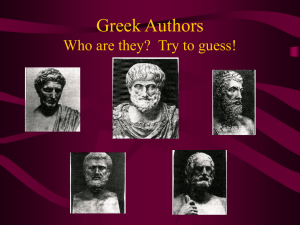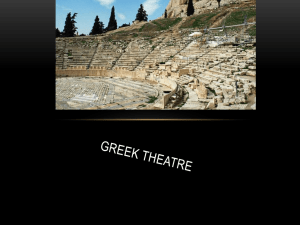Origins Of Theater
advertisement
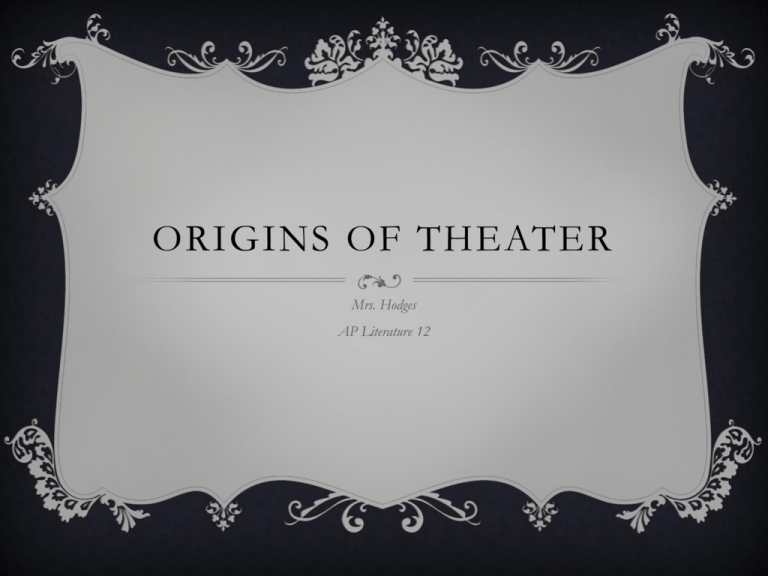
ORIGINS OF THEATER Mrs. Hodges AP Literature 12 ARE YOU A GREEK HERO? You are of noble stature and are meant for greatness Yes No You are virtuous, but not perfect. Yes No COSMO QUIZ Your fate has been decided, but you try to change it. Yes No Your misfortunes are not wholly deserved. Often times your punishment exceeds the crime. Yes No COSMO QUIZ Your downfall or problems are partially your own fault, the result of free choice, not an accident. Yes No RESULTS 1-2 Yes's You are a regular guy. This may sound like a let down, but hey, you get to be saved and your, well, normal. So just relax. say your prayers to the Greek gods, and let the heroes do all the work. 3 Yes's 4-5 Yes's You're a sidekick. You mean well, but you will probably never get the glory of the hero and your costume isn't as cool. However, you are under less pressure to save the day. You are a tragic hero. You are a good person, but you are burdened because of your flaws. You are doomed because of the choices you made. We may or may not pity you. ESSENTIAL VOCABULARY Besiege: (verb) overwhelm Solicitous: (adj) Showing care or concern Enigma: (noun) riddle or puzzle Reproached: (verb) accused, shamed Cognizance: (noun) perception, apprehension, the judicial hearing of a matter Sagacity: (noun) wisdom Changeling: (noun) an infant secretly exchanged at birth Parricide: (adj) one who murders his father, mother, or close relation Pristine: (adj) pure Vexed: (verb) worried, troubled ORIGINS OF THEATER Earliest origins of drama are to be found in Athens where ancient hymns (dithyrambs), were sung in honor of the god Dionysus. These hymns were later adapted for choral processions in which participants would dress up in costumes and masks. ORIGINS OF THEATER 6th Century BC: tyrant Pisistratus established a series of new public festivals. One of these, the 'City Dionysia', a festival of entertainment held in honor of the god Dionysus, featured competitions in music, singing, dance, and poetry. ORIGINS OF THEATER According to tradition, in 534 or 535 BC, Thespis astounded audiences by leaping on to the back of a wooden cart and reciting poetry as if he were the characters whose lines he was reading. In doing so he became the world's first actor, and it is from him that we get the word thespian. DEVELOPMENT OF PLAYS First plays had one actor (protagonist) and the chorus Aschylus added a second speaking role (antagonist) and reduced the chorus size Sophocles then went on to add a third actor Euripides added both a prologue and the deus ex machina, a divine figure who wrapped up any loose ends at the close. GENRES OF PLAYS Comedy Tragedy Satyr COMEDY The first comedies were mainly satirical and mocked men in power in their vanity and foolishness. The first master of comedy was the playwright Aristophanes. TRAGEDY Dealt with: love, loss, pride, the abuse of power and the fraught relationships between men and gods. Typically the protagonist commits some terrible crime without realizing his mistake. The three great playwrights of tragedy: Aeschylus, Sophocles, and Euripides. SATYR Short plays performed between the acts of tragedies and made fun of the plight of the tragedy's characters The satyrs were mythical half-human, half-goat figures and actors wore large phalluses for comic effect STAGING OF AN ANCIENT GREEK PLAY Performed in an outdoor theater, used masks, and were almost always performed by a chorus and three actors, no matter how many speaking characters there were in the play. Performed as part of religious festivals in honor of the god Dionysus and only performed once. Presented in competition ( and voted on) NEED-TO-KNOW TERMS Orchestra: normally circular. It was a level space where the chorus would dance, sing, and interact with the actors who were on the stage near the skene. Skene: building directly behind the stage. It was above the level of the orchestra. TERMS CONTINUED Theatron: Where the spectators sat. Often wrapped around a large portion of the orchestra Parodos: (Parodoi) paths by which the chorus and some actors made the entrances and exits. SOPHOCLES Born 495 B.C. in Athens By age 16, he was already known for his beauty and grace and led a choir of boys. Won first prize in his first competition, beating Aeschylus. Performed in many of his own plays Wrote more than 120 plays, only seven have survived in their entirety. Oedipus is considered his greatest work. BACKGROUND INFO: OEDIPUS REX Greek tragedies were based on well-known myths Heroes were mortals, such as Helen of Troy or Achilles, who were worshipped as demigods after their deaths. Murder and incest violate natural law as well as human law, so these crimes were seen to offend the gods. OEDIPUS REX Apollo's oracle at Delphi was the most important place of prophecy in the Greek world. Audience would already be well aware of the myths surrounding the play. Story is set a few generations before Trojan War. King Laius of Thebes received a prophecy his son would kill him, so he tries to avoid it. FORMAT OF THE PLAY Prologue-summary of past events Parados-build anticipation Scene-develop plot, characters Ode-chorus interrupts the six scenes Exodos-final scene

